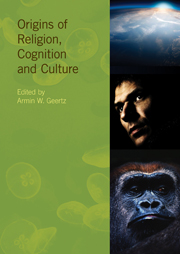Book contents
- Frontmatter
- Contents
- Contributors
- Introduction
- Part I EVOLUTIONARY SCENARIOS
- 1 Whence religion? How the brain constructs the world and what this might tell us about the origins of religion, cognition and culture
- 2 Why “costly signalling” models of religion require cognitive psychology
- 3 The prestige of the gods: evolutionary continuities in the formation of sacred objects
- 4 The evolutionary dynamics of religious systems: laying the foundations of a network model
- 5 Art as a human universal: an adaptationist view
- 6 The significance of the natural experience of a “non-natural” world to the question of the origin of religion
- 7 Religion and the emergence of human imagination
- 8 The origins of religion, cognition and culture: the bowerbird syndrome
- 9 The will to sacrifice: sharing and sociality in humans, apes and monkeys
- 10 Apetales: exploring the deep roots of religious cognition
- Part II COGNITIVE THEORIES
- Index
8 - The origins of religion, cognition and culture: the bowerbird syndrome
from Part I - EVOLUTIONARY SCENARIOS
- Frontmatter
- Contents
- Contributors
- Introduction
- Part I EVOLUTIONARY SCENARIOS
- 1 Whence religion? How the brain constructs the world and what this might tell us about the origins of religion, cognition and culture
- 2 Why “costly signalling” models of religion require cognitive psychology
- 3 The prestige of the gods: evolutionary continuities in the formation of sacred objects
- 4 The evolutionary dynamics of religious systems: laying the foundations of a network model
- 5 Art as a human universal: an adaptationist view
- 6 The significance of the natural experience of a “non-natural” world to the question of the origin of religion
- 7 Religion and the emergence of human imagination
- 8 The origins of religion, cognition and culture: the bowerbird syndrome
- 9 The will to sacrifice: sharing and sociality in humans, apes and monkeys
- 10 Apetales: exploring the deep roots of religious cognition
- Part II COGNITIVE THEORIES
- Index
Summary
[T]he emergence of culture remains a mystery to man. It will so remain as long as he does not succeed in determining, on the biological level, the modifications in the structure and functioning of the brain, of which culture was at once the natural result and the social mode of apprehension.
(Claude Lévi-Strauss 1976: 14)We wished to awaken the feeling of man's sovereignty by showing his divine birth: this path is now forbidden, since a monkey (ein Affe) stands at the entrance.
(Friedrich Nietzsche [1887] 1971: §4, cited in Foucault 1977: 142)As long as there are animals to behave and humans to wonder why, cognitive interpretations and explanations will be offered. In our view this is not only permissible, it is often enlightening. Sometimes it is even science.
(Jamieson & Bekoff 1996: 75–6)Introduction
The pursuit of origins as an explanatory strategy has a long and generally unproductive history of increasingly diminishing returns (Masuzawa 2000). This was especially so during the nineteenth century when this quest, applied to human history, presumed a social-Darwinian view of evolutionary progress in which a natural history replaced but continued to function in the teleological manner of an earlier divine providence.
- Type
- Chapter
- Information
- Origins of Religion, Cognition and Culture , pp. 178 - 202Publisher: Acumen PublishingPrint publication year: 2013

